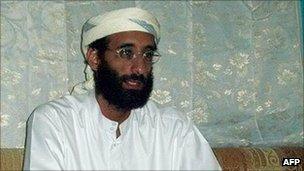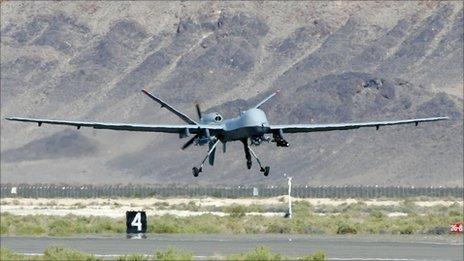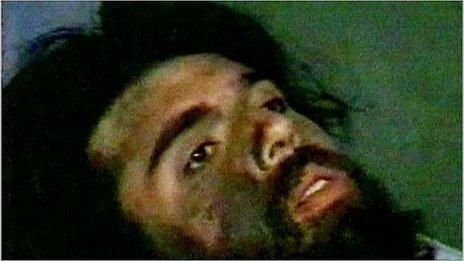Anwar al-Awlaki and America's fear of the enemy within
- Published
- comments

Awlaki's death follows a series of other killings of senior al-Qaeda operatives this summer
Anwar al-Awlaki was an example of one of America's most potent fears: the enemy within.
He was born, raised and educated in America, a citizen of America who turned against the country he knew best.
He literally spoke their language and used it to exhort other Americans to kill their fellow citizens.
It is claimed that he was the intellectual driving force behind just about all the recent attacks or foiled plots.
He is meant to have given religious advice to the soldier accused of the Fort Hood killings.
The man who planned a Times Square bombing said Awlaki was his inspiration.
He "communicated" with the Nigerian accused of trying to blow up a plane using explosives in his underpants.
Attack on First Amendment?
But it is perhaps as a symbol that he both puzzles and infuriates Americans.
Not a tribesman from a distant country who knew of America only through ill-digested propaganda.
He lived here, day by day, for the best part of two decades. He knew the country well. And he hated it.
That scares Americans and makes a minority of them look with suspicion on all those who share his religion.
There will be questions raised about his killing. He was at the top of the US hit list - but this is the execution of an American citizen without a trial.
If the pundits are to be believed, he inspired attacks rather than plotted them, although there are suggestions he had a more operational role recently.
But it raises the possibility that he was assassinated for what he said, not what he did.
Although this will be looked at by many as a legal question, it is really a moral and political one.
Still, very few Americans will worry about the infringements of his rights under the first amendment.
Those who will be most alarmed are left-wingers, natural supporters of the president.
Their distaste undermines Republican arguments that he is craven when it comes to national security, so it does President Obama little political damage and some good.
Indeed, this appears to be another vindication of Mr Obama's policy of seeking out and killing terrorists.
Although aides point out he's merely doing what he said he would do during his election campaign, it is also part of an important transition from counter-insurgency to counter-terrorism.
Yemen is a more virulent breeding ground for America's enemies than Afghanistan. But there aren't thousands of US troops in the Arabian peninsula, nor will there be.
Of course, Yemen and Afghanistan's backgrounds are very different.
Put simply, Mr Obama believes that you don't need thousands of American troops on the ground to keep America safe.
This killing will help him argue the success of that policy.
- Published21 September 2011

- Published30 September 2011
